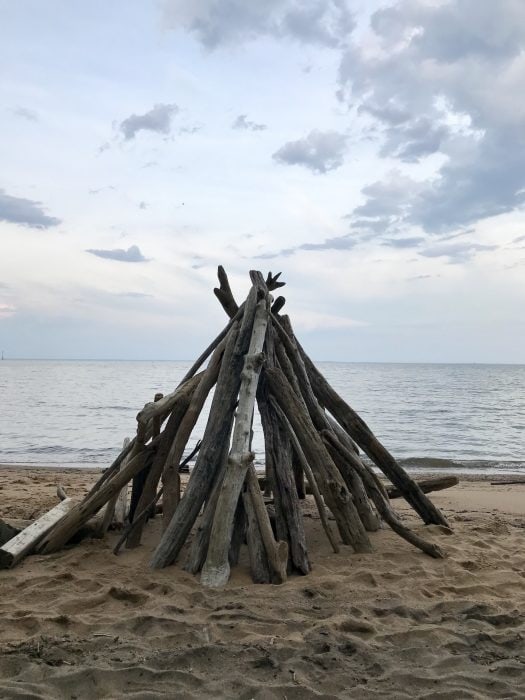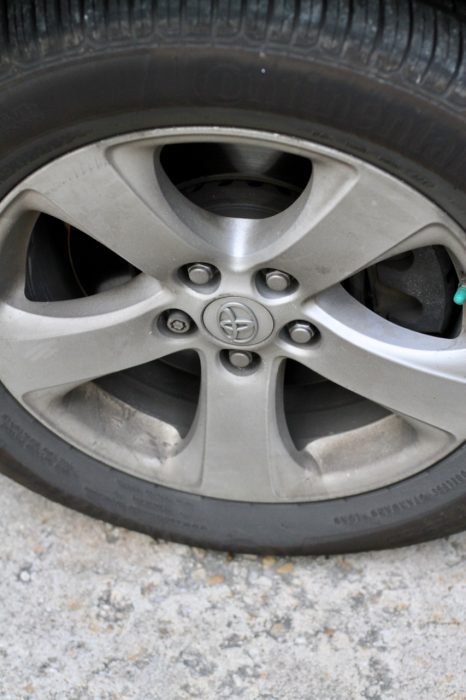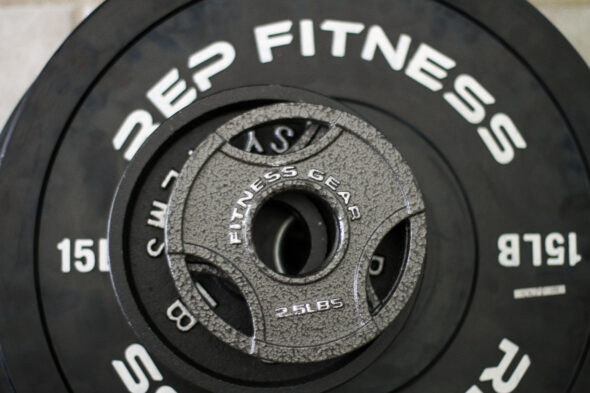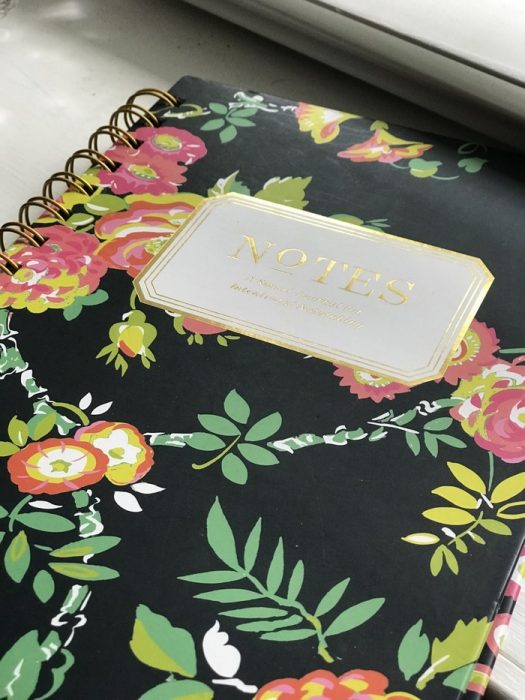Since we’ve been doing thankfulness posts every week around here for a while, thankfulness has been on my mind a lot.
(There are worse things that could be on my mind!)

In particular, I’ve been thinking about how thankfulness is just not easy.
Or natural.
Or our default.
If we relax our imaginary thankfulness muscles, most of us are going to sink down into a state of ingratitude.
Avoiding the rut
It’s sort of like we’re driving along a road, trying desperately to stay out of a rut. And as soon as we stop trying to avoid the rut, boom!
Our wheels slide right down into the ingratitude rut again.

I suppose a lot of things in life are like that; without specific, focused, consistent effort, things go in a direction we don’t want them to.
If we don’t keep an eye on our budget, we tend to spend more than we should.
If we don’t keep an eye on what we’re eating, we tend to eat too much sugar and not enough vegetables.
(Muffins are more fun to eat than spinach. And that’s just a fact.)
If we don’t keep an eye on how we spend our time, we can spend three hours on Instagram and none on laundry/cleaning/reading books/any number of other worthy pursuits.
(This is a self-roast, incidentally. Please see my drastic Instagram measures here, necessitated by my lack of self-control.)
Walking Upstream
To use another metaphor, pursuing good things in your life is like walking upstream.

- It takes effort to make any forward progress
- If you stop putting in effort, you will make backward progress
This could be a little discouraging. We have to put in effort every day until we die??
<keels over from exhaustion at the thought>
BUT.
There’s another truth at play too:
- The more you practice walking upstream, the stronger your muscles become
The currents will still be pushing just as strongly.
And if you stop pushing against the current, you will still be swept downstream.

But when your muscles get stronger, it’s not as hard to push against the currents.
And that means you can make more progress with less exhaustion.
It’s called exercise for a reason
The process of looking for things to be thankful for is often called a “gratitude exercise” or “gratitude practice”.
Both of these words suggest effort.
It’s not called a “gratitude relaxation”, after all!
Not only does “exercise” suggest effort, it also suggest a growth in strength.

I’ve seen multiple scholarly articles, such as this one, share new research showing that our brains actually do change when we exercise our gratitude muscles.
The more our thoughts travel the gratitude “pathways”, the better the pathway gets.
That makes future trips down the gratitude pathway easier, and that encourages more trips, which in turn makes the gratitude pathway better and better.
What does this mean for you?
Two things:
1. You’re normal if gratitude is hard for you
If gratitude feels hard or unnatural, you should know there is nothing wrong with you. Gratitude is hard for everyone!
You should not conclude something like, “I must be the sort of person who is not good at gratefulness.” or, “I guess I just don’t have a grateful personality. Oh well.”
Nope. Your gratitude muscles might be pretty weak and flabby, but I promise they are there.
2. You can get better at being grateful
Is it going to take some work? Will it be really tough at first?
Yep and yep.
But hard does not equal impossible.
You have choices! And you have control! You can train your brain to be better at gratitude.
With enough practice, you might even find yourself inadvertently thinking grateful thoughts.
Two things to try
1. Do some regular thankfulness practice
Join us here on Thankful Thursdays. Make a list in a notebook every morning or every night. Text a friend weekly to share three things you’re thankful for.

Just pick something you can do regularly.
Practice, and be patient; this Berkeley article says that it takes time to see the benefits of gratitude exercises.
2. Try following a complaining thought with a grateful one.*
I don’t know if there are studies proving this*, but for me, complaining begets more complaining.
(*The Berkeley article I linked to earlier does touch on negative words a bit.)
Basically, if I focus on the negative stuff, I feel even more negative.

an accurate depiction of how I feel after complaining for a while
I don’t expect myself to pretend that everything is grand, of course. I just feel better mentally if I acknowledge the bad thing but then avoid excessive dwelling on it.
And for me, complaining falls squarely into the dwelling bucket, not the acknowledging bucket.
You will not be 100% successful at avoiding complaining thoughts or words, but it might help to try to follow a complaint with a grateful thought.
*Please note: Apply this second point to yourself, not to others. If a coworker vents or complains to you and you helpfully suggest a grateful thought they could have (“at least xyz didn’t happen to you!”), you might get slapped. It’s probably not going to be received very well by most people, so zip your lips and focus your energy on your own gratefulness.
I’d love to hear your thoughts. Is gratitude tough for you? If you’ve practiced it for a while, did it get easier?
P.S. I am not addressing things like clinical depression; I’m not a mental health professional, and I have read mixed studies about how much gratefulness helps relieve depression or anxiety (some say yes, it helps, others say it’s not much more effective than a placebo activity).
Regardless, there are lots of other benefits of gratitude, and that’s what I’m writing about in this post.


Dianna
Tuesday 29th of September 2020
I started a journal that I call my "10,000 Gratitudes" about five years ago. I strive to write something I am grateful for each day, but sometimes I write several one day, and none for a few days. I also express gratitude daily in my prayers/reflections. I am totally convinced that these practices enrich my life, help me cope during tough times, and help me to focus on all that is good.
Kristina
Tuesday 29th of September 2020
Some days, focusing on things I can control and things that I'm grateful for does help with my problems, but there are times when it doesn't help. Sometimes we do need to air grievances in order for them to be addressed and fixed, or just let out some air from the pressure that has built up. I think the ingratitude "rut" can be a sign of something that is not being addressed which needs to be, and it shows up in complaining about things that might even be unrelated to what we really need. So, on my run the other day, I formulated in my mind exactly why I've been anxious and frustrated, and I let myself "wallow" in it during the whole run. After my run, I didn't really need to think about it any longer or speak to anyone about it. I had allowed myself to feel the anxiety and sadness over the situation, so I know it's there and when I'm able to, I can address those things. Meanwhile, I do express gratitude for the things that are going well in my life, but it is not at the expense of trying to fix things that are not. (Just my thought about this, not that I'm saying you are doing this, Kristen!)
Kristen
Tuesday 29th of September 2020
Oh, I definitely agree that it's wise to fix things that can be fixed. There is no need to prolong suffering unnecessarily. :)
The gratefulness exercises are really most helpful when the hard things are out of our hands.
But yes, if things can be fixed, then fix away!
Diane Needham
Tuesday 29th of September 2020
As a Christian, I believe that being grateful is essential to acknowledge every day. I may be a widow, I may have most of my family living far away, I may not be able to do as much gardening as I did, and so forth but still God is so good. I have enough to live on, most of my needs are met, and I am independent and have few health needs. I can call my friends, send out cards of encouragement, consolation, congratulations, etc. and spend time in prayer. Putting as smile on my face when I'm out and about, being kind and thoughtful--that's how I want to be seen.
Cari Champagne
Monday 28th of September 2020
This....Thank you!!!
Sarah
Monday 28th of September 2020
I HATE gratefulness exercises, and LOVE appreciation exercises.
Yes, there is a difference.
Jem Horwood
Tuesday 29th of September 2020
Me too!
Kristen
Monday 28th of September 2020
I am so curious to hear your thoughts on what the differences are.